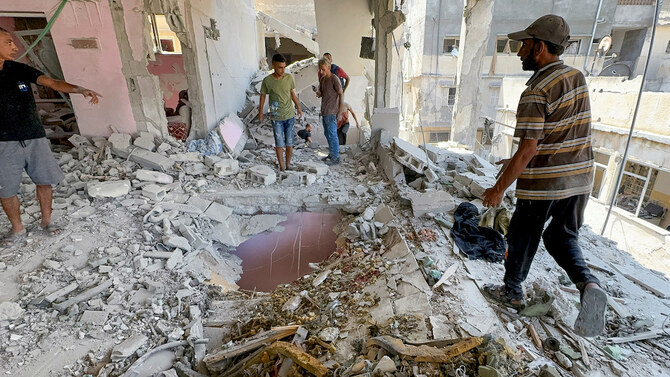CAIRO: Israeli forces pressed on with their operations near the southern Gaza city of Khan Younis on Monday amid an international push for a deal to halt the fighting in Gaza and block a slide into a wider regional conflict with Iran and its proxies.
Palestinian medics said Israeli military strikes on several areas of Khan Younis on Monday killed at least 16 people and wounded several. Meanwhile more families and displaced persons streamed out of areas threatened by new evacuation orders telling people to clear the area.
As fighting continued in several areas of the Gaza Strip, Hamas reacted skeptically to the latest round of Egyptian and Qatari-brokered talks due on Thursday, saying it has seen no sign of movement from the Israeli side.
The group said in a statement on Sunday mediators must force Israel to accept a ceasefire proposal based on ideas by US President Joe Biden, which Hamas had accepted, “instead of pursuing further rounds of negotiations or new proposals that would provide cover for the occupation’s aggression.”
Two sources close to Hamas said the group was convinced the new call for talks was coordinated beforehand with Israel to deter responses from Iran and Hezbollah to the assassination of the group’s chief Ismail Haniyeh in Tehran and a top Hezbollah leader in Lebanon.
“It is a mild rejection you can say. Should Hamas receive a workable plan, an Israeli positive response to the proposal it had accepted, things may change, but so far Hamas believes Netanyahu isn’t serious about reaching a deal,” said one Palestinian official close to the mediation effort.
Hamas’ reaction to the talks came as preparations for a larger scale confrontation grew, with Washington ordering a guided missile submarine to the Middle East and the Abraham Lincoln strike group accelerating its deployment to the region.
Israeli Defense Minister Yoav Gallant told US Defense Secretary Lloyd Austin that Iran was making preparations for a large-scale military attack on Israel, Barack Ravid, a normally well-sourced reporter for Axios News reported on Twitter.
Israel has been braced for a major attack since last month when a missile strike killed 12 youngsters in the Israeli-occupied West Bank and Israel responded by killing a senior Hezbollah commander in Beirut.
A day after that operation, Ismail Haniyeh, the political leader of Hamas, was assassinated in Tehran, drawing Iranian vows of retaliation against Israel.
The potential escalation underlined how far the Middle East has been thrown into turmoil by the war in Gaza, now into its 11th month.
The Hamas-led attack on Israeli communities around the Gaza Strip killed some 1,200 people, with more than 250 taken into captivity in Gaza, according to Israeli tallies, in one of the most devastating blows against Israel in its history.
In response, Israeli forces have flattened Gaza, displaced most of the population and killed around 40,000 people, according to the Palestinian health ministry, in a war that has caused horror around the world.
On Saturday, scores of people were killed in Israeli strikes on a school building in Gaza City that the military said targeted fighters from the armed wings of Hamas and Islamic Jihad.
Gaza health officials say most of the fatalities have been civilians but Israel says at least a third are fighters. Israel says it has lost 329 soldiers in Gaza.



























